初高中英语时间介词
高中介词的用法总结

高中介词的用法总结
高中英语中介词的用法总结如下:
1. 表示在某时间时,常用at、on、in等介词。
at常用来表示在具体的时间点前,如at 7:30;on用来表示在星期几、在某日以及在某一天的上午或下午,如on Monday、on March 1st等;in则常用来表示在一个较长的时间段里,如in the morning、in the afternoon、in a year等。
2. 表示地点时,常用in、at、over等介词。
in表示在一个范围内的某个地点,如in the field;at表示在一个具体的地点,如at the school gate;over则表示悬空或覆盖着某物,如over the table。
3. 表示方式时,常用by、with等介词。
by表示通过某种方式或手段,如by bus、by phone等;with则表示用某种工具或和某人一起做某事,如with a pen、with my friend。
4. 表示目的时,常用for、to等介词。
for表示为了某个目的而做某事,如for your help;to则表示某个动作的方向或指向,如to the school。
5. 表示比较时,常用than、as等介词。
than表示比较的对象,如I am taller than him;as则表示与某人或某物一样,如as tall as him。
以上是高中英语中介词的一些常见用法,希望对你有所帮助。
如果有任何疑问,建议咨询专业英语教师或者查阅英语语法书籍。
高中英语介词用法大全

高中英语介词用法大全介词(虚词),不能在句子中独立充当成分。
它总是用于名词、代词、或相当于名词的其它词类或短语活从句前。
需要掌握的介词有11个:in、on、at、to、from、by、with、for、about、after、before。
时间介词的用法辨析1. 时间介词in、on、at、by的用法辨析A.介词in用来表示一天中*段时间,指天、年、月、季节、周次等。
如:in the morningB.介词on用来表示*一天或星期几,指明具体的时间。
如:on a rainy dayC.介词at用来表示特定的时间、节日、年龄等。
如:at noonD.介词by表示…的时候、到、等到…已经等用在天、时间的前面。
如:by 2 o‘clock2. 时间介词in与after的用法辨析A.介词in + 一段时间用于一般将来时。
如:We’ll go to school in two weeks.B.介词after + 一段时间用于一般过去时。
如:My mother came homeafter half an hour.C.介词after + 时间点常用于一般将来时。
如:We’ll go out for awalk after supper.3. 时间介词for与since的用法辨析A.介词for 表示一段时间如:I have been living here for 10 years.B.介词since 表示从过去*一时间以来如:I have been living here since 2000.4. 时间介词during与for的用法辨析A.当所指的时间起止清楚时用介词during如:He swims every day during the summer.B.如果一段时间不明确则用介词for如:I haven’t seen her for years.5. 时间介词before与by的用法辨析A.介词before表示"在…之前〞如:He won’t come back before five .B.介词by表示"到…时为止,不迟于…〞如:The work must be finished by Friday.6. 时间介词till与until用法的异同和until用在肯定句中,均可表示"直到…为止〞,如:I will waittill(until)seveno'clock.和until用在否认句中,均可表示"在…以前〞或"直到…才〞。
初中英语知识点归纳介词的表示时间与地点
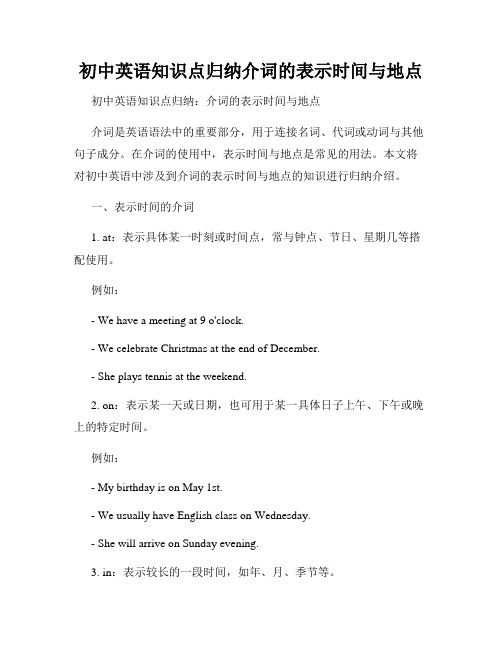
初中英语知识点归纳介词的表示时间与地点初中英语知识点归纳:介词的表示时间与地点介词是英语语法中的重要部分,用于连接名词、代词或动词与其他句子成分。
在介词的使用中,表示时间与地点是常见的用法。
本文将对初中英语中涉及到介词的表示时间与地点的知识进行归纳介绍。
一、表示时间的介词1. at:表示具体某一时刻或时间点,常与钟点、节日、星期几等搭配使用。
例如:- We have a meeting at 9 o'clock.- We celebrate Christmas at the end of December.- She plays tennis at the weekend.2. on:表示某一天或日期,也可用于某一具体日子上午、下午或晚上的特定时间。
例如:- My birthday is on May 1st.- We usually have English class on Wednesday.- She will arrive on Sunday evening.3. in:表示较长的一段时间,如年、月、季节等。
例如:- I was born in 2005.- He will go to Canada in the summer.- They always go skiing in January.4. during:表示在某一段时间内。
例如:- I read a book during the summer vacation.- They have a party during the New Year's holiday.5. for:表示持续的一段时间。
例如:- I have been learning English for five years.- They will stay in the hotel for a week.二、表示地点的介词1. in:表示在一个较大的范围或区域内。
英语高中语法介词的用法和常用介词的区别

英语高中语法介词的用法和常用介词的区别高中英语语法:介词的5种用法1. 时间1)at表示在某一时间点: at 3 o’clock2)in表示在某一时间段内的某一或某些点: in 2004in表示在某段时间的结束点:I’ll see you again in a week.3) during表示某一时间段内自始至终:during the first period4) on表示在某一day/date或其中的某一段:on Monday, on Sunday morning5) by表示不迟于某个时间:by now2. 地点1)at表示在某处(而非它处):at school2) in表示在内部或某个范围内:in the office3) on表示在上面与某平面接触:on the table4) outside表示在某个范围之外:outside world5) under表示在比某个位置低的地方或在某表面之下:under a chair6) by表示靠近或接近:by the window3. 原因1)because of表示因为或以…为理由:because of my father2) for表示动作或活动的目的、目标或意图:for sale3) out of表示起源、来源或原因:out of duty4. 方式1)with表示以…方式:with skill2)in表示以某种方式: in French, in cash, in this way5. 方法1) by表示方法、手段: by the back road, by bus, by working hard2) on表示运送方式:on a train, on foot3) in表示途径或材料:in oils高中英语语法中常用介词的区别1、 at、in、on:如:常用词组有: at noon, at night表示时间的 at, in, on:at 表示片刻的时间,at 8 o’clock,at midnight, at the end of, at that time, at the beginning of, at the age of, at Christmas, at New Year 等。
高中英语知识点归纳介词短语的用法和搭配
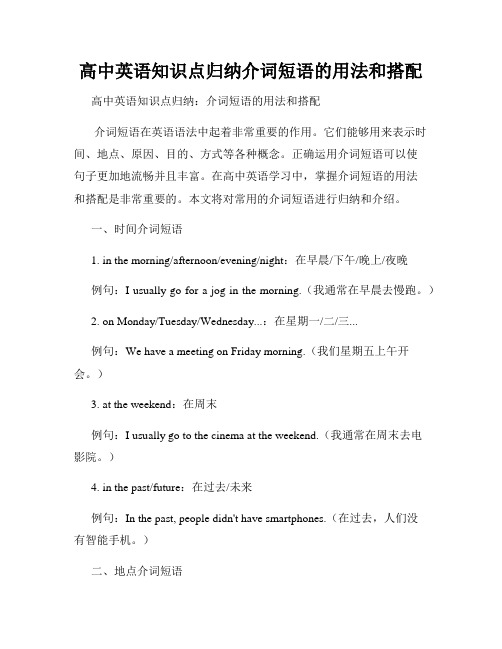
高中英语知识点归纳介词短语的用法和搭配高中英语知识点归纳:介词短语的用法和搭配介词短语在英语语法中起着非常重要的作用。
它们能够用来表示时间、地点、原因、目的、方式等各种概念。
正确运用介词短语可以使句子更加地流畅并且丰富。
在高中英语学习中,掌握介词短语的用法和搭配是非常重要的。
本文将对常用的介词短语进行归纳和介绍。
一、时间介词短语1. in the morning/afternoon/evening/night:在早晨/下午/晚上/夜晚例句:I usually go for a jog in the morning.(我通常在早晨去慢跑。
)2. on Monday/Tuesday/Wednesday...:在星期一/二/三...例句:We have a meeting on Friday morning.(我们星期五上午开会。
)3. at the weekend:在周末例句:I usually go to the cinema at the weekend.(我通常在周末去电影院。
)4. in the past/future:在过去/未来例句:In the past, people didn't have smartphones.(在过去,人们没有智能手机。
)二、地点介词短语1. at the park/school/home:在公园/学校/家里例句:I saw my friend at the park yesterday.(我昨天在公园见到了我的朋友。
)2. in the city/country:在城市/农村例句:I prefer living in the country rather than the city.(我更喜欢住在农村而不是城市。
)3. on the beach/mountain/river:在海滩/山上/河边例句:We had a picnic on the beach last Sunday.(上星期天我们在海滩上野餐。
人教版初中英语介词表

人教版初中英语介词表本文档旨在提供人教版初中英语课程所使用的常见介词表,以便学生更好地理解和运用介词。
以下是介词及其用法的详细列表:1. In(在……里面):- 用于表示位置、时间、状态、方式等- 例句:I am in the classroom.2. On(在……上面):- 用于表示位置、时间等- 例句:The book is on the desk.3. At(在……处):- 用于表示位置、时间等- 例句:He is waiting at the bus stop.4. With(和……在一起):- 用于表示伴随、陪同等- 例句:She went to the park with her friends.5. By(靠近):- 用于表示位置、方式等- 例句:The car is parked by the road.6. For(为了):- 用于表示目的、原因等- 例句:I bought this gift for my mom.7. To(到):- 用于表示方向、目的地等- 例句:We are going to the store.8. From(从……来):- 用于表示起点、来源等- 例句:He came from China.9. With(带有):- 用于表示附带、具有等- 例句:The bag is filled with books.10. By(通过):- 用于表示方式、方法等- 例句:They traveled by train.以上是人教版初中英语常用介词的部分列表,希望对学生们在研究和运用英语中的介词有所帮助。
注意:本介绍并非无害的!望周知!。
中考介词归纳总结

中考介词归纳总结在中考中,介词是一个非常重要且常考的语法知识点。
介词在句子中起连接作用,表达时间、地点、方式、原因等关系。
掌握介词用法对于理解和运用英语至关重要。
本文将对中考所涵盖的常见介词进行归纳总结。
一、时间介词1. on:表示某一天或某一天的上午、下午、晚上等特定时间。
例:I will have a meeting on Monday.2. at:表示具体的时间点或特定的时刻。
例:We will meet at 9 o'clock.3. in:表示某一年、月、季节、时间段等。
例:She was born in 2005.例:We usually go swimming in summer.4. during:表示在某一段时间内。
例:He read a book during his summer vacation.二、地点介词1. at:表示具体的地点。
例:She is waiting for you at the bus station.2. on:表示表面或某物之上。
例:There is a book on the table.3. in:表示在某个范围、区域、国家或大洲内。
例:We live in a small town.4. to:表示朝向、方向。
例:He went to the library.三、方式介词1. by:表示通过某种交通方式或手段。
例:I usually go to school by bus.2. with:表示伴随、陪同。
例:She walks to school with her friends.3. in:表示用某种方式或手段。
例:He communicated with her in English.四、原因介词1. for:表示目的、原因或理由。
例:He went to the store for some milk.2. because of:表示因为。
初中介词用法总结
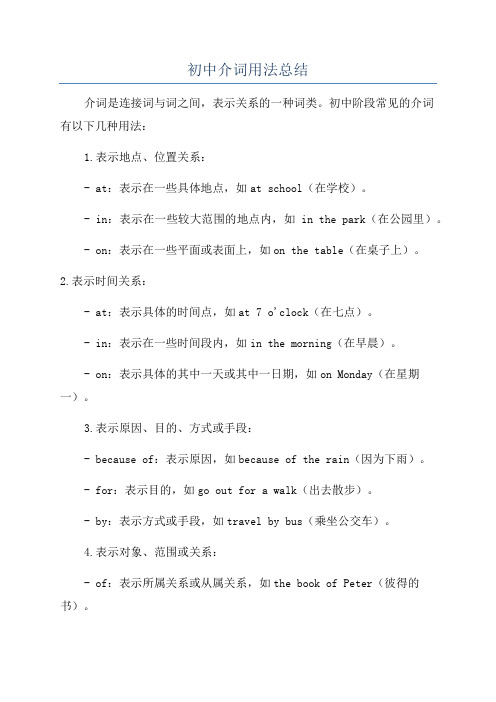
初中介词用法总结介词是连接词与词之间,表示关系的一种词类。
初中阶段常见的介词有以下几种用法:1.表示地点、位置关系:- at:表示在一些具体地点,如at school(在学校)。
- in:表示在一些较大范围的地点内,如in the park(在公园里)。
- on:表示在一些平面或表面上,如on the table(在桌子上)。
2.表示时间关系:- at:表示具体的时间点,如at 7 o'clock(在七点)。
- in:表示在一些时间段内,如in the morning(在早晨)。
- on:表示具体的其中一天或其中一日期,如on Monday(在星期一)。
3.表示原因、目的、方式或手段:- because of:表示原因,如because of the rain(因为下雨)。
- for:表示目的,如go out for a walk(出去散步)。
- by:表示方式或手段,如travel by bus(乘坐公交车)。
4.表示对象、范围或关系:- of:表示所属关系或从属关系,如the book of Peter(彼得的书)。
- to:表示动作的对象,如give a present to him(给他一个礼物)。
- for:表示接受者或受益者,如a present for you(给你的礼物)。
5.表示运动、方向或路径:- to:表示动作的目的地,如go to school(去学校)。
- into:表示进入一些内部,如go into the house(进屋子)。
- through:表示穿过,如go through the forest(穿过森林)。
需要注意的是,有些词不仅可以作为介词,还可以作为副词或连词使用,具体用法需要根据上下文来确定。
此外,介词的用法也有很多特殊情况,需要通过阅读和积累来进行学习和掌握。
高中英语介词知识点总结

高中英语介词知识点总结高中英语介词知识1表时间的介词:about, around, before, by, at, after, in, on, between, during, for, from, since, till, until, within等。
1.表示时间先后的before,after和in。
before表示某一时刻之前和after表示某一时刻之后。
in一般表示“从现在或说话时刻算起某一段时间之后”,用于将来时。
after则表示以过去为起点的某一段时间之后,用于过去时。
“in+时间段"也可作”在……之内"解。
He will be back in a few days. 他几天之后就回来。
He left on Monday and returned after three days. 他星期一走的,三天后回来的。
It's difficult to draw a horse well in half an hour.半小时之内画好一匹马是困难的。
2.表示"时间延续"的for, from...tofor表示动作或状态延续的时间长度,谓语动词必须是延续性的。
而from...to...表示“从……到……”。
We have studied English for three years. 我们学英语已三年了。
My family lived in Beijing from 1996 to 1999.我家从1996年到1999年住在北京。
3.表示"时限"的介词since, from, by, until(till)since表示动作的起始点,其意是 "从……以来 ",常与完成时态连用。
from表示时间的起始点,其意是"从",常和一般过去时连用。
until(prep. & conj.)意为"直到……为止"。
英语 初高中衔接---介词

Fill in the blanks:
at 1.They often have parties ______ Christmas. on 2.They plan to go to Hainan ______ vacation. On of 3.______the morning ______ March 31,she made an important decision in her life. During 4.______ the lifetime, Hepburn earned four more Oscar nominations. since 5.It has rained ______ the day before yesterday. 6.It was a very long day for Jack. He didn’t get until home from school ______ six o’clock.
3. for + 时段 since + 时段 + ago 常用于现在完成时 since + 时间点 since + 一般过去时句子 1.He came here __ 1992, and he has lived here ___ 1992. A. in, for B. in , since C. since, since 2.I have known Li Lei __ over five years. A. in B. since C. for
3. It has been three years since he __ here. A. come B. came C. comes 4. The old man has been away ___ two years ago. A. in B. since C. for
高中英语知识点归纳介词短语

高中英语知识点归纳介词短语介词短语在高中英语学习中扮演着重要的角色。
它们在句子中起到修饰名词、动词或形容词的作用,帮助我们更准确地表达意思。
掌握常用的介词短语,对于理解和运用英语具有至关重要的意义。
本文将对高中英语中常见的介词短语进行归纳。
一、表示时间的介词短语1. in the morning/afternoon/evening:在早上/下午/晚上例如:I usually go jogging in the morning.2. on Monday/Tuesday...:在星期一/二...例如:We have a meeting on Monday.3. at the weekend:在周末例如:I always go shopping at the weekend.4. from...to...:从...到...例如:The library is open from 9am to 5pm.5. during the summer/winter/spring/autumn:在夏天/冬天/春天/秋天例如:I like swimming during the summer.二、表示地点的介词短语1. at school/home/work:在学校/家/工作例如:I study English at school.2. in the park/forest/restaurant:在公园/森林/餐厅例如:We had a picnic in the park last weekend.3. on the street/corner:在街上/拐角处例如:You can find a café on the corner.4. at the bus stop/train station/airport:在公交车站/火车站/机场例如:I will meet you at the airport.5. by the river/sea/lake:在河边/海边/湖边例如:Let's have a picnic by the lake.三、表示方式的介词短语1. by car/bus/train:乘坐汽车/公交车/火车例如:I usually go to work by bus.2. on foot:步行例如:The supermarket is just a few minutes' walk away. I usually go there on foot.3. with a smile/tears:带着微笑/眼泪例如:She accepted the award with a smile on her face.4. in a hurry/rush:匆忙地例如:I left the house in a hurry and forgot my umbrella.5. by oneself:独自地例如:He likes to travel by himself.四、表示原因的介词短语1. because of:因为例如:We couldn't go to the party because of the bad weather.2. due to:由于例如:The delay was due to the heavy traffic.3. thanks to:多亏了例如:Thanks to your help, we finished the project on time.4. as a result of:由于...的结果例如:As a result of their hard work, they won the competition.5. in order to:为了例如:He studied hard in order to pass the exam.五、表示目的的介词短语1. for the purpose of:为了...的目的例如:We organized a meeting for the purpose of discussing the new project.2. with the aim of:以...为目标例如:He started exercising with the aim of becoming healthier.3. in order to:为了例如:She saved money in order to buy a new car.4. so as to:以便例如:I woke up early so as to catch the first train.5. with a view to:考虑到例如:They made some changes with a view to improving the product.本文简要介绍了高中英语中常见的介词短语,旨在帮助学生提高对英语的理解和应用能力。
初高中英语介词重点之常见介词in, on, at 用法差别
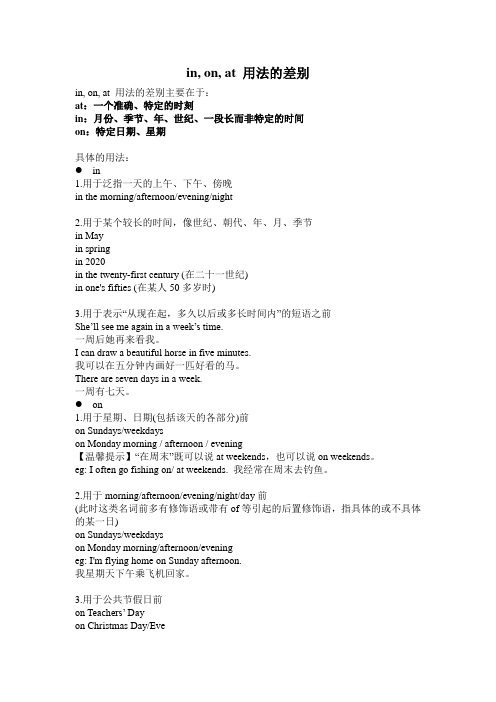
in, on, at 用法的差别in, on, at 用法的差别主要在于:at:一个准确、特定的时刻in:月份、季节、年、世纪、一段长而非特定的时间on:特定日期、星期具体的用法:●in1.用于泛指一天的上午、下午、傍晚in the morning/afternoon/evening/night2.用于某个较长的时间,像世纪、朝代、年、月、季节in Mayin springin 2020in the twenty-first century (在二十一世纪)in one's fifties (在某人50多岁时)3.用于表示“从现在起,多久以后或多长时间内”的短语之前She’ll see me again in a week’s time.一周后她再来看我。
I can draw a beautiful horse in five minutes.我可以在五分钟内画好一匹好看的马。
There are seven days in a week.一周有七天。
●on1.用于星期、日期(包括该天的各部分)前on Sundays/weekdayson Monday morning / afternoon / evening【温馨提示】“在周末”既可以说at weekends,也可以说on weekends。
eg: I often go fishing on/ at weekends. 我经常在周末去钓鱼。
2.用于morning/afternoon/evening/night/day前(此时这类名词前多有修饰语或带有of等引起的后置修饰语,指具体的或不具体的某一日)on Sundays/weekdayson Monday morning/afternoon/eveningeg: I'm flying home on Sunday afternoon.我星期天下午乘飞机回家。
3.用于公共节假日前on Teachers’ Dayon Christmas Day/Eve需要特别注意的是:at,on都可用来表示“节假日”,但at侧重指“休假的时节”,而不是指具体的哪一天;on侧重指具体的时日,与它连用的短语中多含“Day”at New Year (在新年期间)at Christmas (在圣诞节期间)on New Yea r’s Day (在元旦那天)on Christmas Day (在圣诞节)at1.用于钟点前at ten o’clockat a quarter to six2.用于时刻前at noon/night/midnight (半夜)at sunrise (日出时)at dusk (黄昏)at dawn/daybreak (黎明)eg: We will leave at day break. 我们将在黎明时动身。
精确到年月日的介词
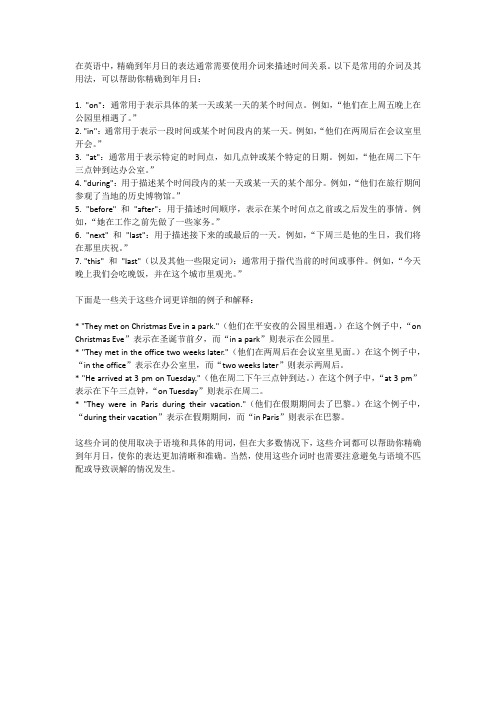
在英语中,精确到年月日的表达通常需要使用介词来描述时间关系。
以下是常用的介词及其用法,可以帮助你精确到年月日:1. "on":通常用于表示具体的某一天或某一天的某个时间点。
例如,“他们在上周五晚上在公园里相遇了。
”2. "in":通常用于表示一段时间或某个时间段内的某一天。
例如,“他们在两周后在会议室里开会。
”3. "at":通常用于表示特定的时间点,如几点钟或某个特定的日期。
例如,“他在周二下午三点钟到达办公室。
”4. "during":用于描述某个时间段内的某一天或某一天的某个部分。
例如,“他们在旅行期间参观了当地的历史博物馆。
”5. "before" 和"after":用于描述时间顺序,表示在某个时间点之前或之后发生的事情。
例如,“她在工作之前先做了一些家务。
”6. "next" 和"last":用于描述接下来的或最后的一天。
例如,“下周三是他的生日,我们将在那里庆祝。
”7. "this" 和"last"(以及其他一些限定词):通常用于指代当前的时间或事件。
例如,“今天晚上我们会吃晚饭,并在这个城市里观光。
”下面是一些关于这些介词更详细的例子和解释:* "They met on Christmas Eve in a park."(他们在平安夜的公园里相遇。
)在这个例子中,“on Christmas Eve”表示在圣诞节前夕,而“in a park”则表示在公园里。
* "They met in the office two weeks later."(他们在两周后在会议室里见面。
)在这个例子中,“in the office”表示在办公室里,而“two weeks later”则表示两周后。
高中英语中常见的介词用法总结
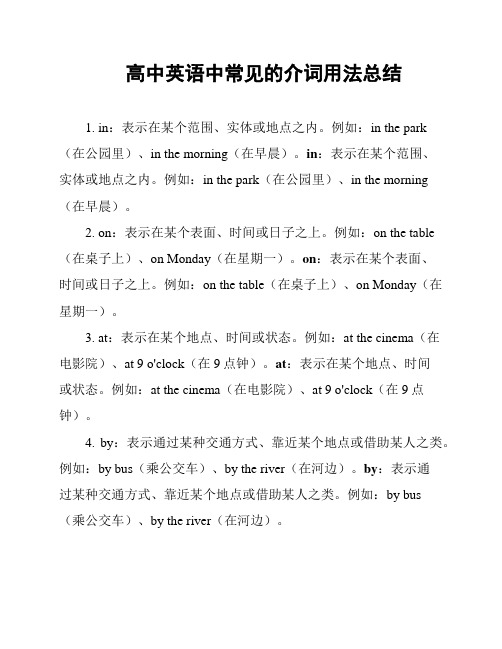
高中英语中常见的介词用法总结1. in:表示在某个范围、实体或地点之内。
例如:in the park(在公园里)、in the morning(在早晨)。
in:表示在某个范围、实体或地点之内。
例如:in the park(在公园里)、in the morning (在早晨)。
2. on:表示在某个表面、时间或日子之上。
例如:on the table (在桌子上)、on Monday(在星期一)。
on:表示在某个表面、时间或日子之上。
例如:on the table(在桌子上)、on Monday(在星期一)。
3. at:表示在某个地点、时间或状态。
例如:at the cinema(在电影院)、at 9 o'clock(在9点钟)。
at:表示在某个地点、时间或状态。
例如:at the cinema(在电影院)、at 9 o'clock(在9点钟)。
4. by:表示通过某种交通方式、靠近某个地点或借助某人之类。
例如:by bus(乘公交车)、by the river(在河边)。
by:表示通过某种交通方式、靠近某个地点或借助某人之类。
例如:by bus(乘公交车)、by the river(在河边)。
5. to:表示方向、目标或接触某物。
例如:go to school(去学校)、give it to me(给我)。
to:表示方向、目标或接触某物。
例如:go to school(去学校)、give it to me(给我)。
7. with:表示陪伴、带有某种特征或使用某物。
例如:play with friends(和朋友一起玩)、a book with a red cover(一本封面是红色的书)。
with:表示陪伴、带有某种特征或使用某物。
例如:play with friends(和朋友一起玩)、a book with a red cover(一本封面是红色的书)。
8. for:表示目的、目标或所属关系。
时间介词的用法总结

时间介词的用法总结介词是英语语法中的一类虚词,用来连接名词、代词或动词短语与其他词或短语的词,以表示它们之间的关系。
时间介词就是用来表示时间关系的介词,包括表示具体时间、时间段、频率、顺序等方面的介词。
本文将对时间介词的用法进行总结,包括时间介词的分类、使用方法和注意事项。
一、时间介词的分类根据时间介词表示的时间关系不同,可以将时间介词分为以下几类:1.表示具体时间点的介词:at2.表示时间段的介词:in, on, during, for, since3.表示顺序的介词:before, after, until, by4.表示频率的介词:in, on, at二、时间介词的使用方法1.表示具体时间点的介词at是表示具体时间点的介词,通常用来表示钟点、节日、特定时刻等时间点。
例如:at 7 o'clock, at Christmas, at noon等。
注意:at用于具体的时间点,表示某时某刻的时间点。
2.表示时间段的介词(1)in:通常用来表示较长的时间段,如年、月、季节等。
例如:in 2022, in January, in summer等。
也可用来表示将来的时间。
例如:I will see you in ten minutes.(2)on:通常用来表示某一天或具体日期。
例如:on Monday,on my birthday等。
(3)during:用于表示在整个时间段内进行的动作或事件。
例如:during the meeting, during the holidays等。
(4)for:用来表示持续的时间段。
例如:for two hours, fora week等。
(5)since:用来表示自从某个时间点开始一直持续到现在的时间段。
例如:since 2010, since I was a child等。
注意:since引导的时间段要使用现在完成时态。
3.表示顺序的介词(1)before:表示在某个时间点之前。
高中英语考点汇总:介词和动词短语
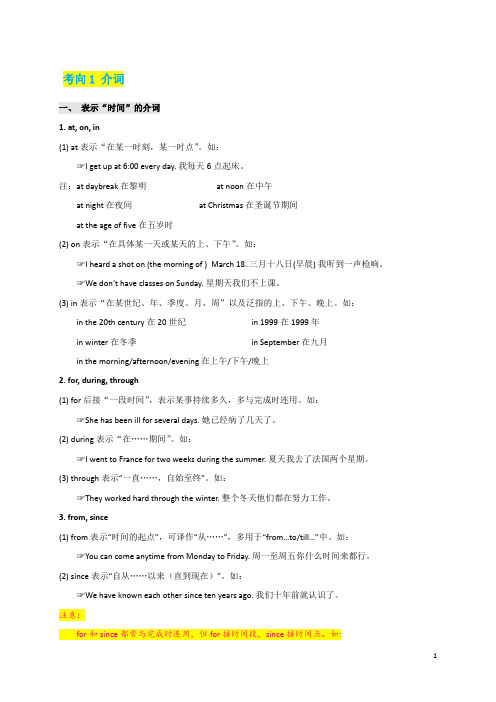
考向1 介词一、表示“时间”的介词1. at, on, in(1) at表示“在某一时刻,某一时点”。
如:☞I get up at 6:00 every day. 我每天6点起床。
注:at daybreak在黎明at noon在中午at night在夜间at Christmas在圣诞节期间at the age of five在五岁时(2) on表示“在具体某一天或某天的上、下午”。
如:☞I heard a shot on (the morning of ) March 18. 三月十八日(早晨) 我听到一声枪响。
☞We don’t have classes on Sunday.星期天我们不上课。
(3) in表示“在某世纪、年、季度、月、周”以及泛指的上、下午、晚上。
如:in the 20th century在20世纪in 1999在1999年in winter在冬季in September在九月in the morning/afternoon/evening 在上午/下午/晚上2. for, during, through(1)for后接“一段时间”,表示某事持续多久,多与完成时连用。
如:☞She has been ill for several days. 她已经病了几天了。
(2)during表示“在……期间”。
如:☞I went to France for two weeks during the summer. 夏天我去了法国两个星期。
(3)through表示“一直……,自始至终”。
如:☞They worked hard through the winter. 整个冬天他们都在努力工作。
3. from, since(1)from表示“时间的起点”,可译作“从……”,多用于“from…to/till…”中。
如:☞You can come anytime from Monday to Friday. 周一至周五你什么时间来都行。
高中英语语法归纳总结介词

高中英语语法归纳总结介词在高中英语学习中,介词(Preposition)是一个重要的语法知识点。
介词通常用于连接名词、代词、动词或其他词与句子其他成分,起到表示时间、地点、方向、原因、目的等各种关系的作用。
本文将对高中英语语法中常用的介词进行归纳总结,帮助同学们更好地掌握和运用介词。
一、介词的基本概念和分类1. 介词的定义:介词是一类虚词,常由一个或多个字母构成,放在名词、代词或动词等前面,用以表示各种关系,如时间、地点、原因、目的等。
2. 介词的分类:- 时间介词:at, on, in, during, for等。
- 地点介词:in, on, at, by, under等。
- 方向介词:to, from, into, out of, up等。
- 方式介词:with, by, in, without等。
- 原因介词:because of, due to, thanks to等。
- 目的介词:for, to, in order to, so as to等。
二、常用介词用法总结1. 时间介词:- at:用于表示具体的点、时刻或某一天的准确时间,如at 7 o'clock, at noon, at Christmas等。
- in:用于表示较长的时间段、月份、季节、年份等,如in the morning, in May, in winter, in 2022等。
- on:用于表示某一天、日期或具体的星期几,如on Monday, on January 1st, on the weekend等。
- during:用于表示整个时间段或某一时期,如during the summer, during the meeting等。
- for:表示持续的时间段,如for two hours, for a week等。
2. 地点介词:- in:用于表示较大的范围、国家、城市、地区等,如in China, in Beijing, in the classroom等。
外研版初中英语九年级上册介词表
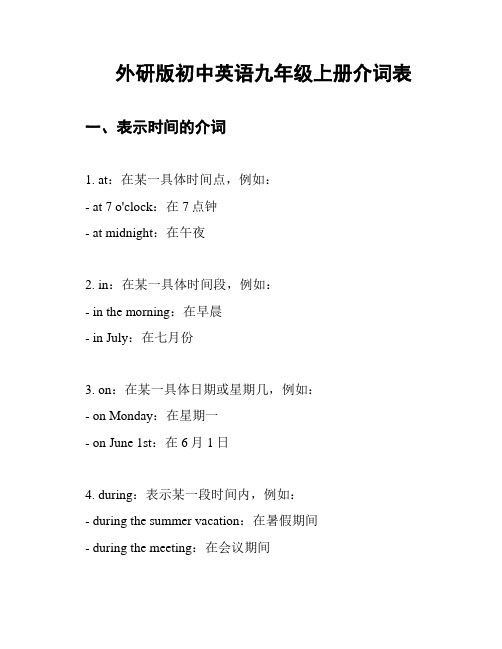
外研版初中英语九年级上册介词表一、表示时间的介词1. at:在某一具体时间点,例如:- at 7 o'clock:在7点钟- at midnight:在午夜2. in:在某一具体时间段,例如:- in the morning:在早晨- in July:在七月份3. on:在某一具体日期或星期几,例如:- on Monday:在星期一- on June 1st:在6月1日4. during:表示某一段时间内,例如:- during the summer vacation:在暑假期间- during the meeting:在会议期间二、表示地点的介词1. at:在某一具体地点,例如:- at school:在学校- at the bus stop:在公交车站2. in:在某一范围或地区内部,例如:- in the classroom:在教室里- in Beijing:在北京3. on:在某个平面上,例如:- on the table:在桌子上- on the wall:在墙上4. to:表示移动方向,例如:- go to the park:去公园三、表示方式的介词1. by:通过某种方式,例如:- by bus:乘公交车- by email:通过电子邮件2. with:用某种工具或伴随,例如:- write with a pen:用钢笔写- go shopping with friends:和朋友一起去购物3. like:像某个样子或方式,例如:- swim like a fish:像鱼一样游泳- run like the wind:像风一样奔跑4. in:以某种方式,例如:- speak in English:用英语说话- dress in red:穿红色衣服以上是外研版初中英语九年级上册的介词表,希望对你学习英语有所帮助!。
高中英语表示时间的介词固定搭配

高中英语表示时间的介词固定搭配在英语的学习中,有很多的语法是学生需要知道的,下面店铺的小编将为大家带来关于表示时间的常用介词的固定搭配介绍,希望能够帮助到大家。
高中英语表示时间常用的介词搭配早、午、晚要用in例:in the morning 在早上in the afternoon 在下午in the evening 在晚上in the day 在白天黎明、午、夜、点与分要用at例:at dawn, at daybreak 在黎明时候at noon 在中午at night 在夜间at midnight 在午夜以上短语都不用冠词at six o’clock 在6点钟at 7:30 (seven thirty) 在7点半at half past eleven 在11点半at nine fifteen 在9点15分at ten thirty a.m. 在上午10点30分at the weekend 在周末日期、年月日、星期几、星期几+早午晚要用on例:on Octorber the first 19491949年10月1日on February the thirteenth l8931893年2月13日on May the first5月1日on the first1号on the sixteenth16号on the second of January 或 on January the second 1月2日on a summer evening在夏天的一个夜晚on Boxing Day在节礼日(圣诞节次日)on New Year’s Day在元旦on my birthday在我的生日但以下例外:in the Christmas holidays在圣诞节假期;in the eighteenth century在十八世纪in ancient times在古代in earlier times在早期in modern times在现代in the present time现在at the present day当今on May Day在“五•一”节on winter day在冬天on Decenber 12th 1950l950年12月12日on Sunday在星期天on Monday在星期一on Tuesday morning星期二早晨on Saturday afternoon星期六下午on Friday evening星期五晚上但以下例外:last night 昨夜;in the evening 在晚上; on time准时,in time及时,等则不同。
时间介词In、on、at在课堂上的应用
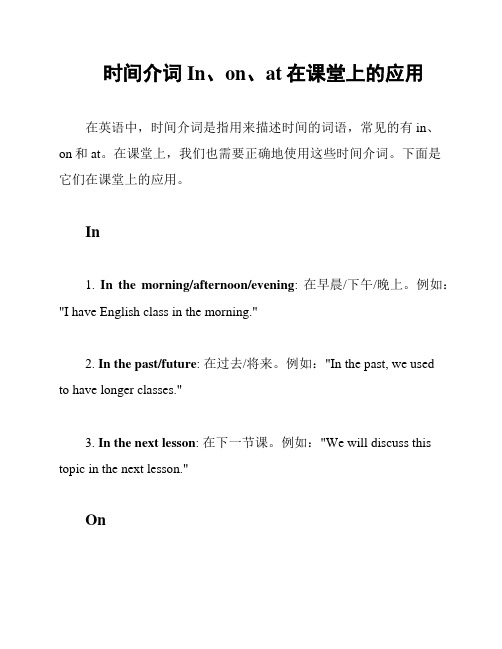
时间介词In、on、at在课堂上的应用在英语中,时间介词是指用来描述时间的词语,常见的有in、on和at。
在课堂上,我们也需要正确地使用这些时间介词。
下面是它们在课堂上的应用。
In1. In the morning/afternoon/evening: 在早晨/下午/晚上。
例如:"I have English class in the morning."2. In the past/future: 在过去/将来。
例如:"In the past, we usedto have longer classes."3. In the next lesson: 在下一节课。
例如:"We will discuss this topic in the next lesson."On1. On Monday/Tuesday/Wednesday, etc.: 在星期一/星期二/星期三等。
例如:"We have a test on Friday."2. On the first/second/third, etc. day of the week: 在星期的第一/第二/第三等天。
例如:"On the first day of the week, we review previous lessons."3. On a specific date: 在具体日期。
例如:"Our final exam is on December 15th."At1. At a specific time: 在具体时间。
例如:"The class starts at 9 o'clock."2. At the beginning/end of the class: 在课堂的开始/结束时。
例如:"At the beginning of the class, we will review homework."3. At the same time: 同时。
- 1、下载文档前请自行甄别文档内容的完整性,平台不提供额外的编辑、内容补充、找答案等附加服务。
- 2、"仅部分预览"的文档,不可在线预览部分如存在完整性等问题,可反馈申请退款(可完整预览的文档不适用该条件!)。
- 3、如文档侵犯您的权益,请联系客服反馈,我们会尽快为您处理(人工客服工作时间:9:00-18:30)。
※具体的某一天或者具体的早上下午晚上
用on:
on the morning o a cold morning
on New Year’s Day on May 1st
※中午半夜用at : at noon at night
年前周前要用in 具体日子却要禁
遇到几号要用on 上午下午又是in 要说某日上下午
用on换in记清楚 午夜黄昏用at 黎明用它也不错
at用在时分前 说“差”可要用上to 说"过''要用past
※几点钟用at :at 8:00 八点钟
※早上下午晚上用in : in the morning
in the afternoon
• in +时间段表示多久以后 用将来时 I will go to college in 2 months 两个 月后我将去上大学
• 时间段+ago 表示多久以前 用过去式
• I went to zoo 5 hours ago 5小时前 我去动物园了
• for+时间段表示做了多久 用完成时
• I have been here for 3 years 我在 这儿已经3年了
※星期几用on: on Monday on Friday 但是如果有next,this,that,last等词修饰
时不加介词on
• ※哪一年用in :
in 2010
• ※哪一月用in :
in July
• 年+月用in : in July ,2010
• 日+月+年用on : on July 13th ,2010
